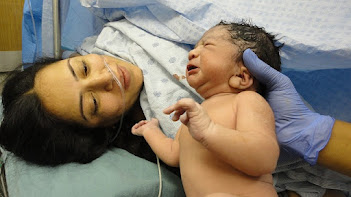Below Are The Stages Of Childbirth:
How painful is childbirth: The Beginning
Early
labor is so subtle that you may not even realize it's happening! You've probably
had Braxton Hicks for weeks at this point, so you just ignore the constant
squeezing. It's as if your stomach is doing crunches without you participating.
How painful is childbirth: The Middle
The
contractions are becoming painful. It's like getting punched in the gut while
someone tries to pull your hips in opposite directions.
However,
this pain only occurs during contractions, so there is some relief in between.
They even hook you up to a monitor these days so you can watch the contraction
peak and subside (very helpful for knowing when one is almost over).
Read: Can A Toothache Cause Labor Contraction?
You
can soak in a tub for most of this, which helped a lot with the pain.
Throughout most of this time, you will be able to sit and talk with the nurses,
and your husband. Breathing and moaning also help a lot with riding the
contraction wave.
How painful is childbirth: Almost the End
You
can't talk at this point because all you care about is getting through the
pain. As the contractions become closer and more intense, you may begin to shake
and sweat profusely.
You
will also become extremely thirsty! Then you'll have this uncontrollable urge
to push. It's the strangest feeling, but you can't stop yourself any longer.
Even if you don't, your body knows what to do.
How painful is childbirth: The End
You
begin to push! It's exactly like taking a big poo. In fact, you will most
likely poop! But that's fine; you don't care at this point; you just want that
baby out.
This
part didn't actually hurt me (my midwife helped me find a good pushing position),
but it was extremely exhausting.
You'll
be sweating and shaking, and your abs will be begging you to stop. It will also
feel like your bumhole is about to turn inside out!
When
the baby begins to move through the birth canal, extreme pressure is applied to
the hips.
The
ring of fire begins when it begins to push out of the vagina. It truly appears
that your vulva is on fire!
This
was more painful for me than the contractions, but you know it's almost over
and you're so pumped up on adrenaline that you give it your all.
Everything
else just sort of slides out once the head is out!
Read: What Is A False Negative?
How painful is childbirth: Baby
The
pain abruptly stops. It may not actually stop, but your body is flooded with
hormones, particularly oxytocin, which feels incredible.
Suddenly,
there is this person who was not previously present, laying on your chest.
Everything
else is hazy, but that little face is sharp. You'll get the shakes and chills
because you worked hard and your body is quickly reverting to how it was before
you were pregnant.
If
your baby can nurse right away (mine just crawled up there and had at it! It's
incredible how babies can do that) you will have contractions, but they will be
less intense.
Nursing
causes the uterus to contract and return to its normal size. These feel similar
to bad period cramps, and they get less frequent as the weeks pass.
Read: Why Are My Tests Going From Positive To Negative?
How painful is childbirth: Postpartum
You'll
be high for a few days. It's so exciting! So much affection! You will find it
difficult to sleep because you can't stop staring ... If you nurse, you will
still experience contractions as well as oxytocin flowing through your veins.
You
could actually feel this happening; there was a strange tickle at the top of
your brain, and you can suddenly feel really good and happy as if you have taken
a nice big pain pill.
Your
genitals will swell like hotdogs. There is a lot of bleeding, but it seems to
settle down to a normal period after a few days. You will feel achy and sore as
if you were in a bad car accident.
Your
breasts will engorge and hurt, but this will pass quickly. If you tore, your
stitches will tug once the swelling subsides, which is extremely painful. You
will cry a lot, sometimes for no apparent reason, but mostly because you are
overwhelmed with emotions and exhausted.
Read: Is It Possible To Be Pregnant And Still Test Negative?
All
of these symptoms should go away in 4-6 weeks. It takes about three months to
feel like yourself again.
In
the end, the memories of the pain will fade, leaving only rose-tinted memories.
Even after only 4 months, you will be in pain, but you will remember how much
fun you had with your husband and the delivery team. During that time, you
talked and laughed, and everyone saw you na--ked, sweating, moaning, and
pooping. Nature, I believe, makes us (women) forget in order for us to continue
reproducing.
FAQs Related To How Painful Is Childbirth
Is giving birth the most painful thing?
While
both have elements of pain, some may last longer than others depending on the
type of surgery, the location of the incision or surgery, and the individual's
health. Unsurprisingly, recovering from surgery can be more painful than
childbirth.
How painful is pushing a baby out?
However,
one in every five women disagreed, claiming that pushing and post-delivery were
the most painful. According to the survey, the majority of participants
compared the worst pain to "extreme menstrual cramps," "bad back
pain," and "a broken bone."
What does childbirth feel like?
Some
people describe the sensation as being similar to intense period cramps, while
others describe it as a tightening or pounding sensation in your uterus or
across your belly, while still others describe the sensation as being similar
to very intense muscle cramps.
Why is delivering a baby so painful?
Contraction
of the uterine muscles and pressure on the cervix cause pain during labor. This
pain manifests as severe cramping in the abdomen, groin, and back, as well as
an aching sensation. Some women also experience pain in their sides or thighs.
Read: What Is The Folic Acid Role In The Body?
What part of birth hurts the most?
While
slightly more than half of those polled said having contractions was the most
painful part of giving birth, about one-fifth said pushing or post-delivery was
the most painful. Post-delivery pain was more painful for mothers aged 18 to 39
than for those aged 40 and older.
How can I give birth without pain?
Massage,
water therapy, and breathing exercises are all common ways to deal with pain.
Relaxation can be aided by music and soothing scents (aromatherapy). Taking
short walks and changing positions during labor can help reduce pain.
Is pushing a baby out like pooping?
Truth:
Because the muscles used for both are identical, pushing a baby out feels
similar to having a bowel movement. And, of course, as you press down, anything
in your path will be eased out — hence the pooping during labor.
What pushing a baby out feels like?
At
this stage, most women will experience increased pressure in their perineum,
rectum, and low back. Rectal pressure feels similar to having a bowel movement
for many women. You may feel a stretching or burning sensation as the baby's head
emerges.








